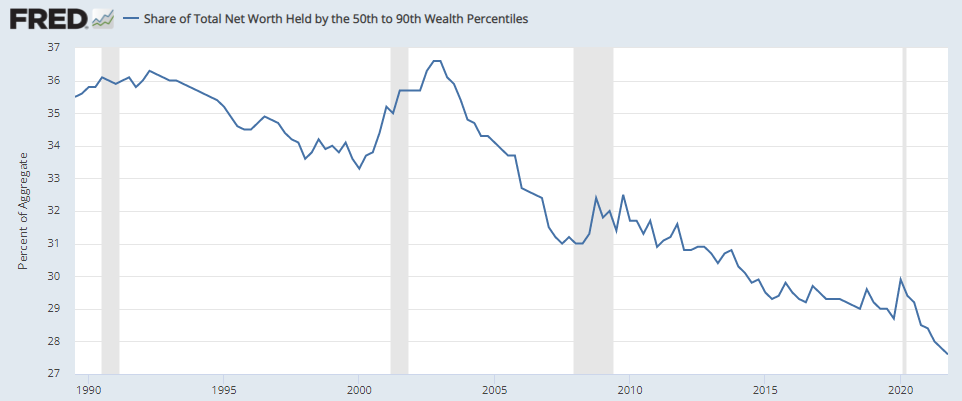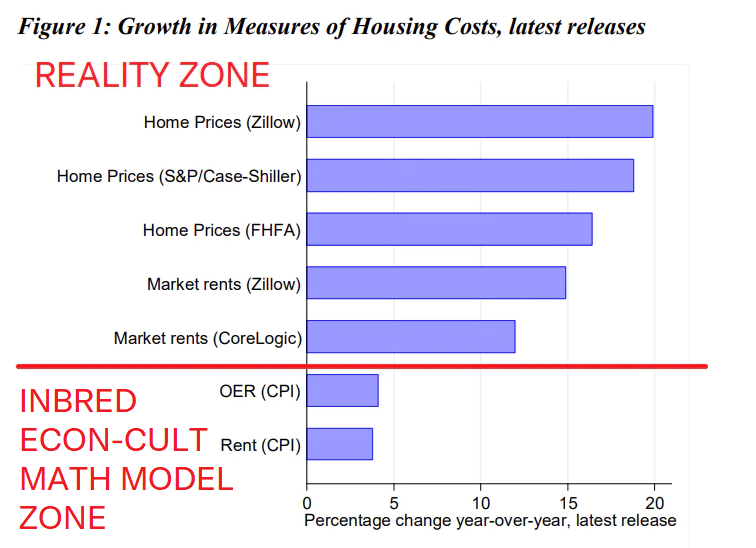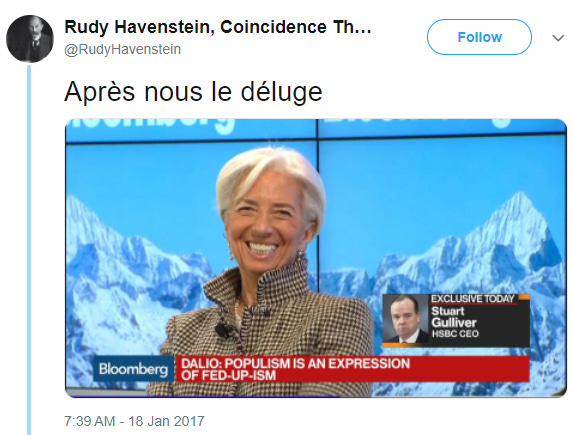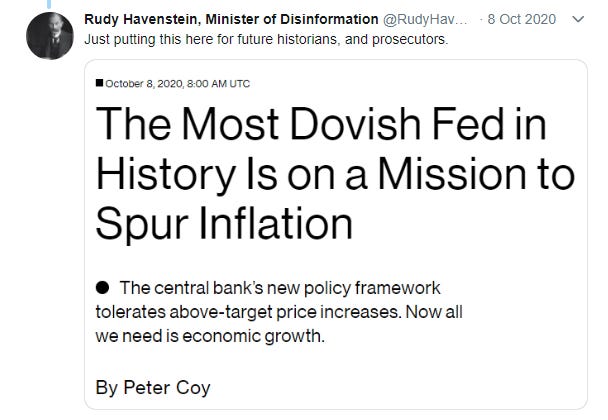The Raven of Zurich
Buy Now, Pay Later is contained.
Wise men have tried other ways. They have tried to understand our state of being, by grasping at its stars, or its arts, or its economics. But, if there is an underlying oneness of all things, it does not matter where we begin, whether with stars, or laws of supply and demand, or frogs, or Napoleon Bonaparte. One measures a circle, beginning anywhere.
Charles Fort, Lo!
Oh good. Janet’s in front of the House today!
As Chris Whalen said on RealVision back in 2021:
I can count on the fingers of one hand the members of Congress who actually understand finance and real estate, and even monetary policy, well enough that you could talk to them on camera. The rest of them, forget about it.
Comforting.
Hey, I found a Bob Farrell rule I disagree with:
I see that Affirm is in the news again. Back in August 2021 I noted this comment, which I saved:
"The fact that a large group of people need to break up a 20 dollar phone charger into four installments is a sign of just how bad things are. I keep seeing these buttons on more and more websites, and for items that cost $20 or even less." - thorosaurus
Central Banks to Increase Gold Holdings Over Crisis Concerns What? Why?? Gold’s a Pet Rock!
Good times. By the way, Gold has actually outperformed the $QQQ since 2000. Before you send hate mail, this is how I view gold.
BoJ’s Kuroda forced to retract claim consumers tolerant of price rises Finger on the pulse these guys. Central bankers really are the new Marie Antoinette’s.
I shouldn’t pick on poor Japan though, what with their spiking rates and all…
Not sure what happened to Elizabeth Warren (Dave Collum says she took to politics way too easily), but she nailed this with the Financial Crisis Inquiry Committee back in September 2010.
Note that a key part of Warren's description here involves the role of inflation in undermining families and leading to the debt explosion:
“...it would be important to think about the increasing economic fragility of middle-class families, starting in the1970’s: a combination of flat wages for fully-employed men, and rising core expenses in housing, in healthcare, in transportation – put a lot of pressure on middle-class families. Many families responded by sending, if they had two parents in the household, sending both parents into the workforce. That kept family income rising, but it was taking two earners to get them in a position where one earner would have been a few years earlier.
Core expenses continued to rise, families stopped saving, and began to take on more debt, to make ends meet until the end of the month, or deal with emergencies that came up. The consequences of job loss or unexpected medical bills became harder and harder hits on the family...
That’s the position that families are in when they hit the, really the late 1990’s. So, families are taking on more debt. The consumer credit market is largely deregulated starting in about 1980. Credit cards are effectively deregulated – when I say “deregulated”, the usury laws were the “tentpole” of consumer regulation since the Code of Hammurabi in the 15th century B.C. through Biblical times through Colonial times in America, through every state in the union. That tent pole of usury is knocked out, effectively, first for credit cards in 1979 and then explicitly by Congress on mortgages in 1980.
It takes more than a decade for the industry to begin to adapt new business models, but the old model, of screening customers carefully, and only lend to those whom you have a fair amount of confidence will be able to repay, gave way to a far more profitable model of lend widely, and in large amounts, and reap large short-term profits from people who have only a marginal capacity to repay.”

Hey, Jeff Epstein Protégé Larry Summers co-wrote a paper! (I added the red labels)
In the book 1931, Tobias Straumann described Felix Somary:
Somary was one of the most respected analysts of his time. Whenever a crisis loomed, ministers, central bankers, and business leaders—from the Austrian Rothschild family to the President of the Reichsbank, Hjalmar Schacht, and the Social Democratic Finance Minister, Rudolf Hilferding—would seek out what Somary had to say.
…Somary himself had witnessed Black Thursday (24 October 1929) in New York, when the market had lost more than 10 per cent of its value in one day. He was alarmed by the collapse of confidence and immediately cabled to his partners in Zurich: ‘Keep clients out of the market. Crisis just beginning.’
…‘What drives us into the crisis? There is an enormous amount of insoluble debt’…As we know…Somary was proved to be absolutely right. The Wall Street crash and the banking problems in Austria and Belgium were not temporary disturbances, but the beginning of the worst economic crisis of modern times.
…Why was Somary able to predict the economic collapse with such accuracy? One reason was his background. He was a well trained economist with a rich practical experience as a banker and political adviser.
…Another reason why Somary was able to make precise predictions was that he was gifted with a sixth sense for looming catastrophes. One of his friends, the Swiss diplomat Carl Jacob Burckhardt, observed in a letter to the Austrian writer Hugo von Hofmannsthal: ‘There is a curious guy whom you also know, this Somary . . . He is one of those people who foresees crises; he is also clear-sighted when it comes to politics. All the predictions that I have heard from him have come to pass, some of them in an entirely amazing way.’ Somary once told his son: ‘I sense the future in my bones; it is not only about knowledge. It is signalled not in my head, but in my marrow.’
…Somary was not surprised that Keynes underestimated the looming crisis. In June 1926, at a reception held by the German banker Carl Melchior in Berlin, he had talked to him. Asked by Keynes what he was advising his clients, Somary gave the usual pessimistic answer: ‘To insulate themselves as much as possible from the coming crisis, and to avoid the markets.’ Keynes strongly disagreed. ‘We will not have any more crashes in our time. I think the market is very appealing, and prices are low. And where is the crash coming from in any case?’ Somary replied: ‘The crash will come from the gap between appearance and reality. I have never seen such a storm gathering.’ Keynes was not convinced and insisted on talking about shares of individual companies.
Somary’s analytical and prognostic capabilities were highly appreciated, but his predictions were ignored. His audience liked his independent thinking, but were confused by his lack of orthodoxy.
Felix Somary’s memoir, The Raven of Zurich:
“Thus it was that defrauding the saver became a patriotic virtue, and remained one with short interruptions for an entire generation: inflation, that is confiscation without legal authority and without any limits, was the incubator for both Bolshevism and Hitlerism.”
Governments that embarked on the policy of cheapening their currencies relied on two arguments: the example of their enemies and the impossibility of financing the war in any other way. The grandiose slogan that insisted on concern for the Fatherland being more important than concern for the worth of the currency was even then repeated ad nauseam…
Thus it was that defrauding the saver became a patriotic virtue, and remained one with short interruptions for an entire generation: inflation, that is confiscation without legal authority and without any limits, was the incubator for both Bolshevism and Hitlerism. When we began to raise our voices in warning back at the beginning we were condemned as money-obsessed, and ridiculed as hard-hearted financial types and gloomy hand-wringers. But even our most pessimistic forecasts were far exceeded by the dreadfulness of the actual consequences.
“…state bankruptcy is a one-time surgical intervention, while inflation is a permanent poisoning of the very bloodstream of a society.”
At a meeting of the Society of Economists in Vienna, when the Mark was quoted at 80 to the dollar, and the Austrian Krone at 60, I urgently warned of the danger that the currency would lose all its value, and proposed immediately after the Armistice, and repeatedly thereafter, that Germany and Austria declare a state of default.
My reasoning was not understood, and the fact that a banker should make such a proposal was considered paradoxical. However, state bankruptcy is a one-time surgical intervention, while inflation is a permanent poisoning of the very bloodstream of a society. After state debts are wiped out, new financing can be undertaken immediately, while inflation means a prolonged wait until the currency has lost all value. Despite the enormous loss that state default entails, it clarifies the entire situation, and the total damage thus sustained cannot be compared with the appalling terminal stages of an inflation.
l am today [Somary died in 1956 - RH] more than ever convinced that my views then were correct. Much wretchedness in the intervening period could have been avoided through an immediate declaration of bankruptcy: the steady series of devaluations, the total destruction of confidence in government, the prostitution of the economy which governments so often slavishly tried to justify. The banks resisted most strongly of all, but they too would have fared better with a default, which would have allowed them to clear their balance-sheets immediately. Instead they dragged on for another decade in Berlin, Vienna and Budapest, with repeated individual collapses, until the world-wide crisis revealed the true dimensions of the situation.
“…when the bank [Schumpeter] joined after leaving the Finance Ministry collapsed, he ruefully admitted that l had been right; and added with irony that all he had left now was his mother's assets that had been left under my management. He was not alone in that position: a whole series of individuals who publicly attacked me then confided to me either their own or their family accounts.”
I had especially sharp disputes with my old classmate and friend Joseph Schumpeter, then Austrian Finance Minister, on the question of inflation versus bankruptcy. He implored me to organise a consortium in Zurich, the prime currency market of the continent, to maintain the exchange rate of the Austrian Krone. l told him that was impossible: Austria's enormous state debt had to be liquidated either by a devaluation of the currency or by a total write-off. Schumpeter could not bring himself to contemplate the latter step because of its effect on the banks and the special assurances that had been linked to war loans. But later when the bank he joined after leaving the Finance Ministry collapsed, he ruefully admitted that l had been right; and added with irony that all he had left now was his mother's assets that had been left under my management. He was not alone in that position: a whole series of individuals who publicly attacked me then confided to me either their own or their family accounts.
Resistance to inflation might have been expected from two quarters: the banks and the insurance companies, for both institutions were undermined by the phenomenon. But both, just like the banks in present-day America, were so crippled by their gigantic holdings of government bonds that they had sunk to the level of mute government slaves. l tried to sound the alarm among the academics.
#NeverForget
In 1923, "Havenstein went before the Reichsrat (Senate) to boast that his round-the-clock operation of the printing presses now enabled him to produce 46 billion marks in new currency every day. Not a single member of the Reichsrat objected








Bin ich Zürcher!
Somary was a misunderstood banker & at times considered an outcast by politicians especially because he addressed uncomfortable & complex issues of his time including WWI & II & the Depression. Just consider his wheel house of experience as applied today.
Had he been here today, after reading his work, he would have suggested world war & depression today are no exaggeration:
- Russian invasion of Ukraine
- Ruder less Govts‘ on HOW to deal w/
issue
- Battle over energy & commodities
- Massive debt not resolved w/o INFLATIONARY measures taken by Govts/CB‘ers
- Global complacency that growth & democracy will win the day.
I can only confirm Dr Havenstein‘s The Raven of Zuruch‘s TIME HAS COME.
Bitte passen Sie auf - es geht um alles 🎯🙏
That's a great book Rudy, too bad I could only find it in a low quality pdf.
It must have been very sad for Somary to see it all coming and not be heard.
It is very sad for us that things have not changed.